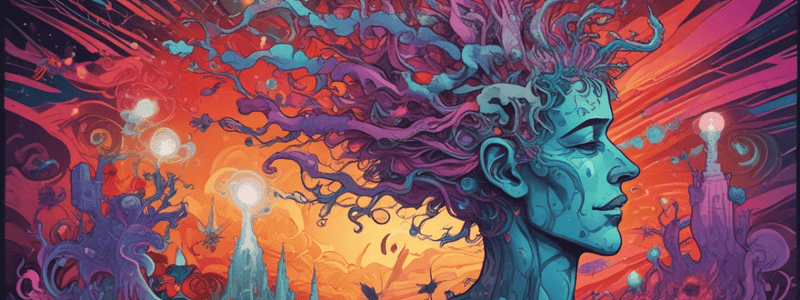Podcast
Questions and Answers
What results from the excessive use of psychoactive substances?
What results from the excessive use of psychoactive substances?
- Improved physical health
- Cravings and dependence (correct)
- Increased cognitive function
- Enhanced emotional stability
How is drug abuse characterized?
How is drug abuse characterized?
- Using prescription medication as directed
- Using substances in a way not directed by a doctor (correct)
- Using drugs only in social settings
- Exclusively using natural supplements
What is a potential consequence of regular drug use?
What is a potential consequence of regular drug use?
- Improved self-control
- Diminished cravings
- Balanced neurotransmitter levels
- Imbalances in the mind (correct)
What defines alcohol abuse?
What defines alcohol abuse?
What signifies the progression from drug abuse to addiction?
What signifies the progression from drug abuse to addiction?
Which situation indicates a likelihood of drug abuse?
Which situation indicates a likelihood of drug abuse?
What can result from regular and excessive drug use?
What can result from regular and excessive drug use?
What is considered a primary characteristic of drug abuse?
What is considered a primary characteristic of drug abuse?
Which of these scenarios is most indicative of a person being dependent on drugs?
Which of these scenarios is most indicative of a person being dependent on drugs?
Which neurotransmitter-related effect is associated with psychoactive substance use?
Which neurotransmitter-related effect is associated with psychoactive substance use?
How is drug dependence commonly recognized?
How is drug dependence commonly recognized?
What often marks the transition from drug abuse to addiction?
What often marks the transition from drug abuse to addiction?
Flashcards are hidden until you start studying
Study Notes
Drug Use and Its Effects
- Psychoactive substances lead to neurotransmitter release, affecting behavior regulation.
- Regular or excessive use of drugs can cause imbalances in the brain, resulting in cravings and dependence.
- Dependence can be physical (bodily need for the substance) or psychological (emotional need for the substance).
Stages of Drug Use
- Drug abuse is the initial stage, characterized by improper use of medications or illicit substance use.
- Warning signs of drug dependence emerge as patterns of abuse continue.
- Addiction represents the most severe outcome of drug dependence, where control over substance use is lost.
Distinction Between Abuse and Dependence
- Drug abuse entails using prescription medications contrary to a doctor's instructions or engaging in illicit drug use.
- Alcohol abuse is defined by excessive consumption, often marked by attempts to become heavily intoxicated regularly.
- Signs of abuse include high quantities of substance intake, inability to control usage, and reliance on substances for specific functions such as relaxation or confidence.
Drug Use and Its Effects
- Psychoactive substances lead to neurotransmitter release, affecting behavior regulation.
- Regular or excessive use of drugs can cause imbalances in the brain, resulting in cravings and dependence.
- Dependence can be physical (bodily need for the substance) or psychological (emotional need for the substance).
Stages of Drug Use
- Drug abuse is the initial stage, characterized by improper use of medications or illicit substance use.
- Warning signs of drug dependence emerge as patterns of abuse continue.
- Addiction represents the most severe outcome of drug dependence, where control over substance use is lost.
Distinction Between Abuse and Dependence
- Drug abuse entails using prescription medications contrary to a doctor's instructions or engaging in illicit drug use.
- Alcohol abuse is defined by excessive consumption, often marked by attempts to become heavily intoxicated regularly.
- Signs of abuse include high quantities of substance intake, inability to control usage, and reliance on substances for specific functions such as relaxation or confidence.
Studying That Suits You
Use AI to generate personalized quizzes and flashcards to suit your learning preferences.




